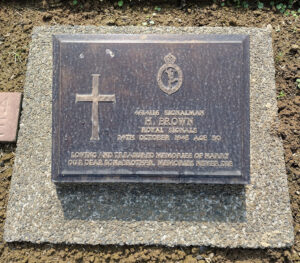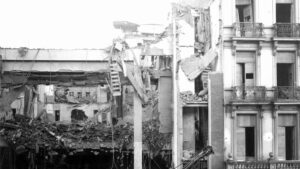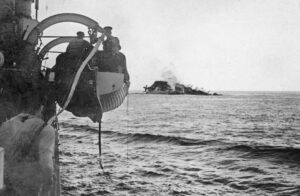Commemorating Royal Signals War Dead – New Page, ‘B’
The Royal Signals casualties whose surnames begin with ‘B’ have now been included on the War Dead page on this website (the document opens as a pdf).
‘B’ is the most common initial letter for surnames in England, accounting for about 11% of the population, and slightly less common in Wales and Scotland. Not surprisingly, therefore, surnames beginning with ‘B’ account for the same proportion of Royal Signals casualties (568 all ranks).

The grave of Signalman H. Brown of Eastern Command Signals, who was crushed by a falling building at about 11.00pm on 23 October 1943 during a powerful earthquake in northern Assam, India. He died of his injuries on 24 October 1943, aged 30.
The casualties include:
One hundred and eighty-five who were killed in action or died of wounds, including:Sapper W. H. Bunning of ‘F’ Divisional Signals, who was killed in action in Waziristan on 19 January 1921, the first Indian Signal Corps casualty of that campaign. Also killed in this action were Signalman Hanuman Singh of ‘F’ Divisional Signals and Signalman Suwaru Ram of 23rd Infantry Brigade Signal Section.
Signalman P. Bannerman, ‘F’ Squadron, General Headquarters Liaison Regiment (Phantom) attached to 2nd Special Air Service Regiment, who was killed in action on or shortly after 20 October 1944 while exfiltrating to Allied lines after Operation Loyton during the North-West Europe Campaign. In the same incident, Signalman G. G. Johnston was murdered after being captured.
Corporal R. Barnes of No. 70 Construction Section, No. 5 Railway Telegraph Company, who was wounded on 16 December 1944 (the first day of the Ardennes offensive) when a V2 rocket destroyed the Cinema Rex in Antwerp during the North-West Europe Campaign. He died of wounds on 17 December 1944. The audience were watching the 1936 Western film The Plainsman when the rocket hit—a little under 600 civilians and military personnel killed or died as a result of their injuries including eight Royal Signals soldiers from various units; a significant number of Royal Signals soldiers were wounded.
Staff Sergeant J. I. Baker and Lieutenant J. A. Barry who were killed in action during the Falklands War and Signaller W. N. E. Bland of 16th Signal Regiment who died of wounds on 11 August 2008 during the Afghanistan War.

Cinem Rex, Antwerp
In addition, eight men were killed in action at sea, including:Signalman H. Bennett of 2nd Air Formation Signals who died on 17 June 1940 when RMS Lancastria was sunk during Operation Aerial, the evacuation of Allied military forces and civilians from ports in western France. Five other men from 2nd Air Formation Signals were killed: Signalmen J. A. Drabble, E. Dyer, C. Holland, J. Jones and E. McGowan—all were from Glossop in Derbyshire.
Serjeant S. Blackshaw of Transport Draft ROFWG, who was part of a six-strong signal section destined for St. Helena, and was killed in action at sea on the night of 6/7 December 1942 when the troopship SS Ceramic was sunk by U-515 in the Atlantic Ocean en route to Australia via St. Helena and South Africa. All but one of the 655 passengers and crew were lost. The other Royal Signals casualties were Company Quartermaster Sergeant R. D. Proud and Signalmen A. E. D Coombes, L. T. Miller, A. M. Neil and W. Smith.

The sinking of RMS Lancastria
One hundred men died as prisoners of war in the Second World War—89 as prisoners of the Japanese and 11 as prisoners of the western Axis powers. The majority of those that died in the Far East did so while working as labour on the Thai-Burma Railway but 16 prisoners of war were killed in action at sea (11 in the Far East and five in the Mediterranean) when ships they were aboard were sunk by Allied submarines and aircraft (over 10,000 Allied prisoners of war were lost at sea in the Far East), including:Signalman J. Bolton, formerly 4th Armoured Brigade Signals, who was captured in June 1942 during the Battle of Gazala in the Western Desert Campaign. He was Killed in action as a prisoner of war at sea on 14 November 1942 when the Italian cargo ship SS Scillin was sunk by HMS Sahib in the Mediterranean. Thirty-two Royal Signals soldiers were lost.
Signalman R. Burditt, formerly Malaya Command Signals, who was captured during the Malayan Campaign/Battle of Singapore and transported to work on the Thai-Burma Railway in November 1942; he returned to Singapore in mid-1944. He was killed in action as a prisoner of war at sea on 21 September 1944 en route from the Philippines to Japan when SS Hofuku Maru was sunk 80 miles north of Corregidor by aircraft flying off United States Navy carriers. Fifty-five Royal Signals soldiers were lost.
Signalman D. B. Benjamin, Signalman A. J. Birch and Signalman J. W. A. Brewis, all on Transport Draft RMHWG, who died on 22 November 1945 when Consolidated Liberator, serial KH126, of No. 53 Squadron, Royal Air Force crashed near RAF Merryfield in Somerset shortly after take-off bound for India. Eighteen Royal Signals soldiers, four officers of various regiments, including Lieutenant A. G. Quick, Indian Signal Corps, and five aircrew were lost. Signalman Benjamin’s brother, Trooper S. M. Benjamin, died of wounds on 18 July 1944 while serving with 147th (10th Battalion, The Hampshire Regiment) Regiment, Royal Armoured Corps in the Battle of Normandy during the North-West Europe Campaign.
Seventy men died in road traffic accidents, nine died in ‘battle accidents’ (many of which were also traffic accidents) and 23 men did in various other accidents,Ninety-eight men died of disease or natural causes, many from diseases that today are readily treatable,Thirteen men drowned while swimming when off duty,Seven men died as a result of the negligent discharge of a weapon,Twenty-one men took their own lives,One died of ‘misadventure’ (poisoned as a result of drinking the contents of an unlabelled bottle),Three men were murdered,Twenty-two men died of unknown causes. These were mostly men who died after the war had ended but in the period of post-war commemoration and most probably died of disease or natural causes.The post Commemorating Royal Signals War Dead – New Page, ‘B’ first appeared on Nick Metcalfe.



